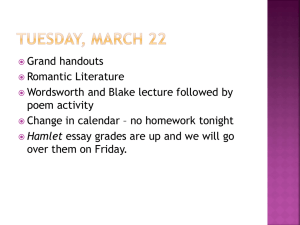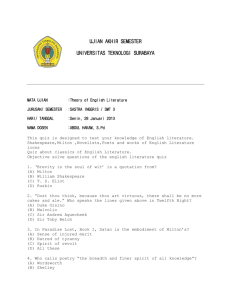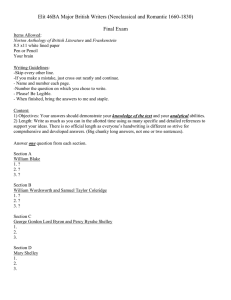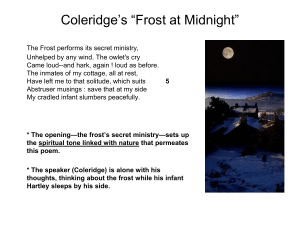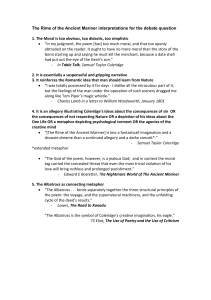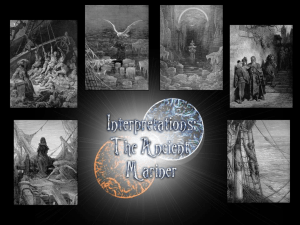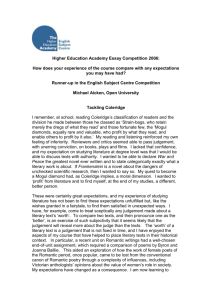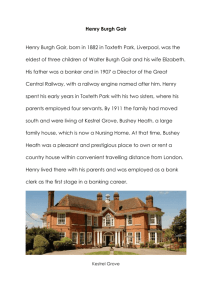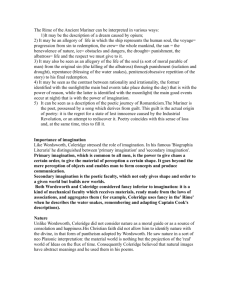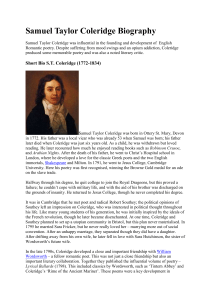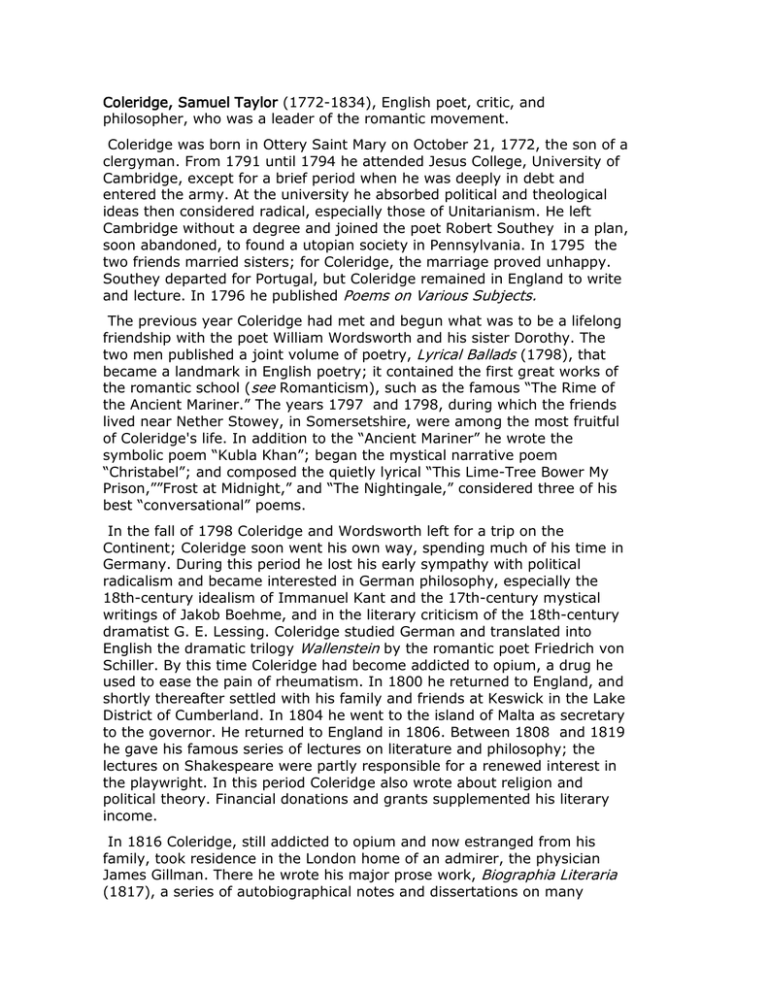
Coleridge, Samuel Taylor (1772-1834), English poet, critic, and
philosopher, who was a leader of the romantic movement.
Coleridge was born in Ottery Saint Mary on October 21, 1772, the son of a
clergyman. From 1791 until 1794 he attended Jesus College, University of
Cambridge, except for a brief period when he was deeply in debt and
entered the army. At the university he absorbed political and theological
ideas then considered radical, especially those of Unitarianism. He left
Cambridge without a degree and joined the poet Robert Southey in a plan,
soon abandoned, to found a utopian society in Pennsylvania. In 1795 the
two friends married sisters; for Coleridge, the marriage proved unhappy.
Southey departed for Portugal, but Coleridge remained in England to write
and lecture. In 1796 he published Poems on Various Subjects.
The previous year Coleridge had met and begun what was to be a lifelong
friendship with the poet William Wordsworth and his sister Dorothy. The
two men published a joint volume of poetry, Lyrical Ballads (1798), that
became a landmark in English poetry; it contained the first great works of
the romantic school (see Romanticism), such as the famous “The Rime of
the Ancient Mariner.” The years 1797 and 1798, during which the friends
lived near Nether Stowey, in Somersetshire, were among the most fruitful
of Coleridge's life. In addition to the “Ancient Mariner” he wrote the
symbolic poem “Kubla Khan”; began the mystical narrative poem
“Christabel”; and composed the quietly lyrical “This Lime-Tree Bower My
Prison,””Frost at Midnight,” and “The Nightingale,” considered three of his
best “conversational” poems.
In the fall of 1798 Coleridge and Wordsworth left for a trip on the
Continent; Coleridge soon went his own way, spending much of his time in
Germany. During this period he lost his early sympathy with political
radicalism and became interested in German philosophy, especially the
18th-century idealism of Immanuel Kant and the 17th-century mystical
writings of Jakob Boehme, and in the literary criticism of the 18th-century
dramatist G. E. Lessing. Coleridge studied German and translated into
English the dramatic trilogy Wallenstein by the romantic poet Friedrich von
Schiller. By this time Coleridge had become addicted to opium, a drug he
used to ease the pain of rheumatism. In 1800 he returned to England, and
shortly thereafter settled with his family and friends at Keswick in the Lake
District of Cumberland. In 1804 he went to the island of Malta as secretary
to the governor. He returned to England in 1806. Between 1808 and 1819
he gave his famous series of lectures on literature and philosophy; the
lectures on Shakespeare were partly responsible for a renewed interest in
the playwright. In this period Coleridge also wrote about religion and
political theory. Financial donations and grants supplemented his literary
income.
In 1816 Coleridge, still addicted to opium and now estranged from his
family, took residence in the London home of an admirer, the physician
James Gillman. There he wrote his major prose work, Biographia Literaria
(1817), a series of autobiographical notes and dissertations on many
subjects, including some brilliantly perceptive literary criticism. The
sections in which Coleridge defines his views on the nature of poetry and
the imagination and discusses the works of Wordsworth are especially
notable. Other writings were published while he was in seclusion at the
Gillman home, notably Sibylline Leaves (1817), Aids to Reflection (1825),
and Church and State (1830). He died in London on July 25, 1834.
Coleridge was esteemed by some of his contemporaries and is generally
recognized today as a lyrical poet and literary critic of the first rank. His
poetic themes range from the supernatural to the domestic. His treatises,
lectures, and compelling conversational powers made him perhaps the
most influential English literary critic and philosopher of the 19th century.
Coleridge's eldest son, Hartley Coleridge, was an accomplished scholar,
best known for his verse, which is singularly fine in mood and happy in
expression. His Poems appeared in 1833 and a biographical study,
Worthies of Yorkshire and Lancashire, in 1836.1
1"Coleridge, Samuel Taylor."Microsoft® Encarta® Encyclopedia 2001. © 1993-2000 Microsoft
Corporation. All rights reserved.

